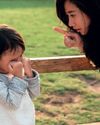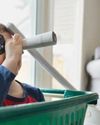Preschoolers are naturally active, and with that comes bruises, scrapes and other accidents. Here’s how to deal with common childhood emergencies.

Deep scratches and cuts
Deep cuts tend to bleed a lot, so first compress the wound with a clean towel to stop the bleeding. Once the bleeding stops, wash the cut under running water for five to 10 minutes to get rid of dirt. Apply an antiseptic gel or cream and leave the wound to heal.
“Observe the child to make sure the wound is healing, and see a doctor if there are any signs of infection such as increased swelling, redness, pus discharge or fever,” says Dr Lynette Wee, a paediatric senior resident from KK Women’s and Children’s Hospital.
If it’s a huge open wound, compress it, but still seek emergency care immediately, says Dr Ratna Sridjaja, a paediatrician from Gleneagles Hospital. “Any open wound may mean the need for a tetanus booster even when the child is currently immunised.”
Shallow burns and scalds
Wash the wound under cool (not cold) running water for 10 minutes. Dr Ratna says you shouldn’t apply ice, butter, grease, medicine or ointment to the burn – just put a gauze bandage lightly over it.
Burns and scalds are extremely painful, says Dr Wee, so it is a good idea to give your child painkillers.
You should also look for signs of infection like increased redness or swelling. “If it’s a large area or it involves the face, eyes, groin area, palms and soles of the feet, see a doctor immediately,” she adds.
For fast-acting relief for shallow burns and scalds, you can use Aluminaid (from $2.95 at Guardian and Unity outlets). This burn dressing conducts heat away from first- and second-degree burns, thus relieving pain and preventing the heat from damaging deeper tissue layers. It comes in a range of sizes for use on the hands, torso, arms and legs.
Nosebleeds
This story is from the Young Parents Preschool Guide 2017 edition of Young Parents Pre-School Guide.
Start your 7-day Magzter GOLD free trial to access thousands of curated premium stories, and 9,000+ magazines and newspapers.
Already a subscriber ? Sign In
This story is from the Young Parents Preschool Guide 2017 edition of Young Parents Pre-School Guide.
Start your 7-day Magzter GOLD free trial to access thousands of curated premium stories, and 9,000+ magazines and newspapers.
Already a subscriber? Sign In

What's Your Kid's Learning Style?
Every child learns differently. Here’s how to leverage on their innate learning styles for academic success.

8 Foods To Improve Kid's Brain Function, Memory And Focus
These eight foods help improve brain function, memory and focus, so your child can perform better in school.

Are You Disciplining Right?
When it comes to disciplining preschoolers, ignoring tantrums or being too permissive can backfire. Here are common discipline mistakes to avoid.

What You Must Know About Speech Problems
Find out if your toddler’s language development is on track, what to do about stuttering and when to seek help about speech disorders.

6 Steps To A Healthier Child
Keeping active is good for your little one’s development, but make sure you support her with the right nutrition, sun protection and even regular downtime.

The world is their classroom
Amber Yong, the globetrotting supermum of Instagram stars @leialauren, is far from kiasu when it comes to her kids’ preschool education. She shares why.

You'll Be Fine
There are many reasons behind your preschooler’s continued separation anxiety. Find out which issue bugs her and fix it fast.

Money Talks
It’s never too early to teach your child about the value of saving, especially after festive periods and when he’s flush with birthday hongbao.

No More Tears
There are several reasons behind your child’s tears when you drop her off at preschool. Learn to identify them and tailor your response accordingly.

Let Them Play
Open-ended play is critical for your child’s development, but what does that mean? Experts explain how you can help your little one.